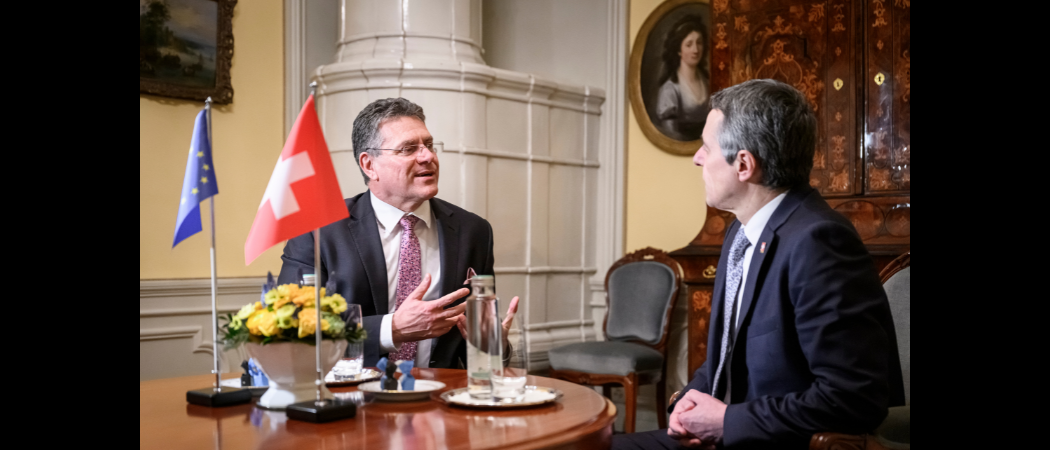Some in Switzerland had feared the country might have to wait years to associate. But with the European Commission opening exploratory talks yesterday, there are now hopes for a deal next year

Maroš Šefčovič, vice-president of the European Commission for interinstitutional relations (Left), meeting with Ignazio Cassis, head of the Swiss Federal Department of Foreign Affairs in March 2023. Photo: European Union
Swiss university leaders have welcomed the announcement yesterday by the European Commission that it will finally open exploratory talks on Horizon Europe association, with hopes this could lead to an agreement as early as next year.
Normally stalwarts of EU research framework programmes, the Swiss have been shut out of Horizon since 2021 after Bern walked away from negotiations to secure a wider political agreement with the EU.
But this broader negotiation between Brussels and Bern is now back on track, leading research commissioner Iliana Ivanova to yesterday announce that “exploratory talks on Swiss association to Horizon Europe can start”.
This is significant, because some in Switzerland had been worried the Commission would wait until a broader political deal was done before turning towards the specifics of Horizon association. But Ivanova’s announcement indicates they will progress in parallel, significantly speeding things up.
“The excellent news […] is that those discussions on Horizon Europe will go in parallel with the political discussions (not in sequence),” said Luciana Vaccaro, president of the umbrella body swissuniversities.
This progress is “quicker than I thought,” said Vaccaro, and “gives a hope for a signature [on an association deal] in 2024”.
“After such a long time of uncertainties and with the feeling that things weren't moving forward, it's clear that this is excellent news,” said Yves Flückiger, rector of the University of Geneva.
The “exploratory talks” announced by Ivanova aren’t yet full negotiations. Instead, they are a scoping exercise before both sides seek a formal negotiating mandate, in the EU’s case from the European Council.
If things go to plan, formal negotiations should hopefully start in the spring, said Xavier Pilloud, head of office at Netzwerk Future, a grouping of Switzerland’s universities, research funders and MPs. “March is realistic,” he said.
Negotiation points
Switzerland is a veteran of the framework programmes, so some aspects of the negotiation should be straightforward. However, some issues remain to be discussed.
One is price. The deal is expected to be on a “pay as you go” basis, whereby Switzerland will have to pay more money to Brussels if its researchers do unexpectedly well winning grants, but on the flip side, Bern can recoup money if receipts from association are disappointing.
The thresholds at which these “clawback” mechanisms kick in bedevilled talks between the UK and EU before they finally agreed an association deal in September. There could be a similar round of haggling when the Swiss make it to the negotiating table proper.
Another concern, which is new to Horizon Europe, is the exclusion of non-EU countries like Switzerland from calls seen as crucial to EU technological sovereignty, like space or quantum technologies. This has been a live issue in Brussels since the Commission in 2021 proposed excluding Israel, the UK and Switzerland from certain calls in these areas.
The talks are to some extent a race against time to get a deal sorted before EU elections in June. After then, Brussels will be in upheaval as a new Commission is appointed, likely delaying talks with the Swiss.
When could Swiss researchers apply?
One unknown in the negotiations, however, is whether Swiss scientists will have to wait until the deal is fully signed off before applying, or will be able to start before that point. “We still don’t know,” said Pilloud.
A spokesperson for the Commission said the EU would be open to allowing applications before a deal is signed.
“As part of the broad package [of political talks between Brussels and Bern] the EU agreed to consider a transitional arrangement to allow Swiss researchers to apply in calls under Horizon Europe even before the association agreement is effective”, they said.
“However, unless otherwise provided in the rules of the programme, grants can only be signed with Swiss entities once the association is finalised.”
There is also a risk that any hiccups in the broader, political talks could disrupt Horizon negotiations, as the Commission has repeatedly linked the two together, despite protests from science groups in Switzerland and the UK.
But Pilloud now believes there is wind in the sails of both sets of talks. “We see the political will, on both sides,” he said. Commission executive vice president Maroš Šefčovič announced on 21 November that the Commission had endorsed a so-called common understanding with Switzerland, which will form the basis for formal negotiations in the wider political talks.
The final caveat to this week’s progress is that ultimately, Swiss voters will have to approve any broader political deal with the EU in a referendum.
If Swiss voters say no, it’s unclear whether this would cause Switzerland to be abruptly thrown out of Horizon Europe. “It has to be cleared up”, said Pilloud. “But of course it’s a risk”.





 A unique international forum for public research organisations and companies to connect their external engagement with strategic interests around their R&D system.
A unique international forum for public research organisations and companies to connect their external engagement with strategic interests around their R&D system.